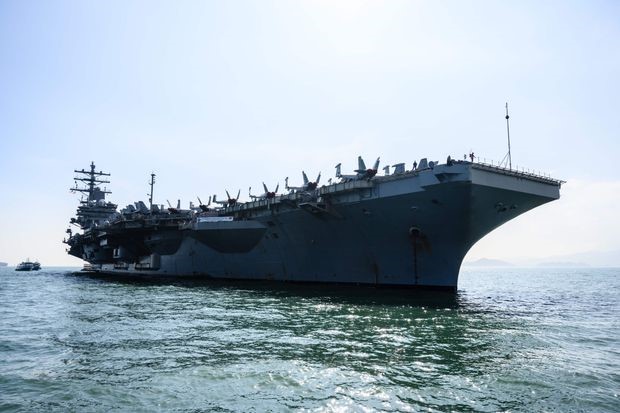Why Is America Steaming Out of the Pacific?
The Pentagon chief calls China the ‘pacing’ challenge but is wearing out naval assets in the Middle East.
By Dustin Walker
The USS Ronald Reagan aircraft carrier during a port visit in Hong Kong on Nov. 21, 2018./ PHOTO: ANTHONY WALLACE/AGENCE FRANCE-PRESSE/GETTY IMAGES
The aircraft carrier the USS Ronald Reagan will deploy from its home port in Japan to the Middle East this summer to support the withdrawal of U.S. troops from Afghanistan, The Wall Street Journal reported earlier this week.
The move came at the request of U.S. Central Command and was approved by Defense Secretary Lloyd Austin.
The Reagan’s deployment undermines the claim—made by the past three American presidents—that the Indo-Pacific is America’s priority.
It also suggests that the Biden administration is conducting a phantom withdrawal of U.S. troops from Afghanistan—removing boots on the ground to fulfill a campaign promise to end “forever wars,” but replacing ground operations with other forces conducting similar missions at great difficulty and expense.
A carrier has been present in the Middle East for years, which is wearing out the Navy’s carrier force.
The USS Abraham Lincoln spent more than 220 days operating in the region on a 295-day deployment that ended in January 2020, the longest of any carrier since the end of the Cold War.
The USS Eisenhower, currently operating in the Middle East, is on a “double pump” back-to-back deployment.
The carrier spent more than 200 consecutive days at sea on its previous deployment.
It can no longer put off repairs, and due to years of high carrier demand, the only carrier available to backfill it is the Reagan.
That means the U.S. won’t have an aircraft carrier in the Indo-Pacific for months.
The Pentagon frequently touts the Indo-Pacific as its priority theater; Mr. Austin has said, “China is our pacing threat.”
Indeed, the 2018 National Defense Strategy said that if necessary, the U.S. should accept risk in the Middle East and other theaters to focus assets and resources in the Pacific.
This move does the opposite and sends a terrible message to Pacific allies and partners: America doesn’t have the will or focus to live up to its commitments.
This is more firepower for China’s diplomats, who repeat this refrain in capitals throughout the region.
And even as U.S. forces rush to leave Afghanistan, the Biden administration still intends to support the Afghan military with training and surveillance aircraft.
The administration also plans to continue counterterrorism operations from “over the horizon” locations outside Afghanistan.
Neighboring countries aren’t likely to agree to station U.S. forces. Military commanders will have to rely on strike aircraft operating from distant bases in the region, requiring more refueling aircraft.
And the requests for carrier presence will keep coming. The U.S. is at risk of replacing a small force inside Afghanistan with a larger force outside.
The Reagan’s deployment isn’t only a question of carrier presence in the coming months, but in the coming years.
It’s up to Mr. Austin to end the circular logic that an aircraft carrier is always needed in the Middle East—to support troops on the ground, to protect them when they withdraw and to replace them once they have left.
It’s the same faulty logic some use to argue that a carrier is needed to deter Iran and its proxies from attacking U.S. forces, and needed again to prevent escalation once the attack occurs, despite little evidence that carrier presence influences Iran’s behavior.
All of this is particularly salient as Mr. Austin prepares to present the Pentagon’s budget request to Congress.
He is asking lawmakers to make hard choices to prepare the military for the China challenge—divesting of certain older platforms to free up dollars to invest in new equipment, for instance.
This strategy is risky because it assumes America can get by with a smaller force today.
But it will be doubly so if the Pentagon overburdens that smaller force with unrestrained deployments to the Middle East.
An American strategy that treats the Pacific as the highest priority will require a serious shift in mentality.
Mr. Austin can start that process by canceling the Reagan’s deployment to the Middle East and showing he’s willing to follow his own advice and make hard choices.
His tenure began amid questions of whether a former commander in the Middle East was suited to manage a strategic shift to the Pacific.
It isn’t too late to prove the doubters wrong.
Mr. Walker is a former professional staff member on the Senate Armed Services Committee and adviser to Sen. John McCain.

0 comments:
Publicar un comentario